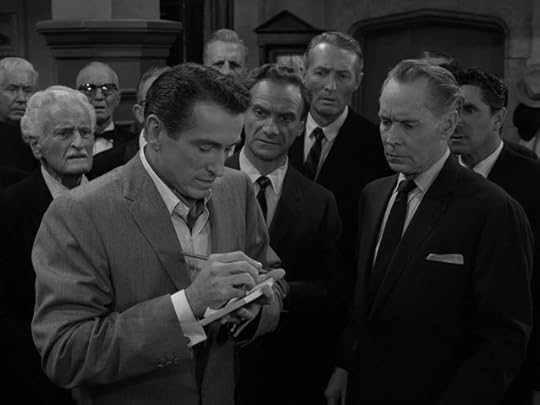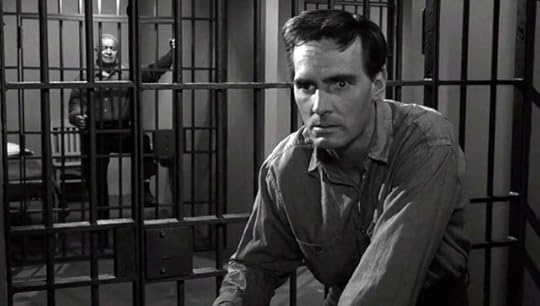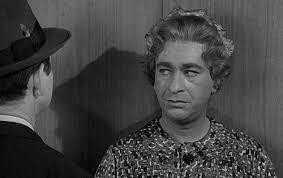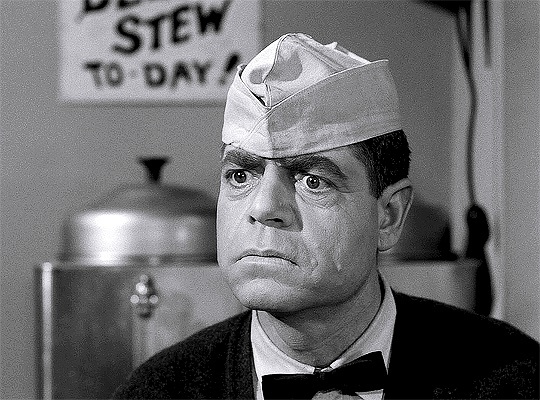August 23, 2024: The Twilight Zone rewatch continues with the final episodes of season 2!
Season 2, Episode 25, “The Silence”
This episode was initially telecast April 28, 1961.
One of only four Twilight Zone episodes that possess no supernatural, science fiction, or fantasy elements.
The entire episode was filmed on Stage 3 at Hal Roach Studios.
This episode was inspired by Anton Chekov’s short story, “The Bet”, about a banker who bets a man he cannot spend 15 years in isolation.
Actor Franchot Tone, who played Colonel Archie Taylor, was rumored to be the cause of the infamous Joan Crawford – Betty Davis feud. Crawford ended up marrying Tone, but the marriage did not last as Crawford’s success overshadowed his own onscreen career. Against the advice of friends, he pursued and married escort-turned-actress Barbara Payton. The marriage lasted mere weeks and culminated in Tone getting the living crap beaten out of him by Payton’s possessive former boyfriend Tom Neal, a former boxer and actor who was subsequently blackballed from the industry following the assault. This would become a running theme for Tone. Producer Buck Houghton offers the following account of what occurred during the production of this episode: “So he was shooting for us, and on the second day of shooting Tome didn’t show up. And we waited, and we waited. And, you know, the call is six in the morning and when it got to be 10:00 am, everybody is just sitting around waiting. We got his agent, who tracks him down – he’s in a clinic. It seems that in the parking lot of Romanoff’s (restaurant), he decided that he liked the look of some girl, and he went after her. First she hit him, then her boyfriend hit him, and then stomped his face on the gravel so that the left side of Tone’s face was like a gigantic overripe watermelon. And I said “So be it. Come in, Franch, and we’ll shoot the other side of your face. Which we did.””
Tone was apparently responsible for the creation of the Best Supporting Actor/Actress categories in the Academy Awards as a result to his performance in Mutiny on the Bounty (1935).
Liam Sullivan, who played the chatty Jamie Tennyson, enjoyed modest success onscreen. He is perhaps best known to genre fans as King Parmen from the Star Trek (1966) episode “Plato’s Stepchildren”. He would appear in a second Twilight Zone episode, “The Changing of the Guard”, co-starring alongside Donald Pleasance. Sullivan reflected on his time shooting this episode: “Rod was a very quiet fellow on set. He let the director take over on most things. He was a terrific writer, and after that experience I was a Twlight Zone Fan..” Also: “The long speech I had in the opening sequence was three pages. The day of shooting, Rod came up to me and asked if I could memeorize an additional page of dialogue on the spot. I was doing so well, he wanted to lengthen the scene. I said if he could write that fast, I could memorize it. He went off into a corner and started scribbling. He handed me the sheets of his note-pad, I picked a corner and started memorizing. He was very pleased with the results.”
Cyril Delvanti, who played the part of Franklin in this episode, would appear in four Twilight Zone episodes. He was previously in “A Penny for Your Thoughts” in which he played the fantasy-minded bank employee L.J. Smithers.
Jonathan Harris, last seen as the doctor in “Twenty Two”, makes an appearance in this episode as George Alfred. Harris on working with Serling: “Rod was on set when I worked with Franchot Tome and we chatted a little here and there. He was a very imaginative man, and very gentle. Many years after, I went to work on The Liar’s Club and Rod was the host. I would make these funny faces and cross my eyes and he would laugh and laugh. He would beg me, repeatedly, not to do it on camera and every time I was evil and he would just laugh.”
Oh, I quite liked this one, yet another episode I don’t remember watching. I suspected he had removed his tongue and this was seemingly confirmed for me when it was revealed he did not eat for a week after being placed in the room, but the vocal chords worked just as well. The episode reminded me of Roald Dahl’s equally creepy wager-themed short story “The Man from the South” (1948). If you haven’t read it, I strongly recommend you do.
Season 2, Episode 26, “Shadow Play”
This episode was first broadcast March 5, 1961.
George Clayton Johnson on this episode: “You know what I think is the best show, the one that has, for me, the greatest power? It’s the one with Denis Weaver that Beaumont wrote.”
In the movie Vanilla Sky (2001), when the hero dreams he is in Times Square, this episode is playing on the Jumbotron.
Actor Dennis Weaver, who played the condemned Adam Grant in this episode, was a gifted athlete who placed 6th in the 1948 Olympics Trials in the Decathlon. As an actor, he found early success as Sheriff Matt Dillon’s assistant, Chester Goode, on Gunsmoke (1955). Nine years later, he starred in his own shortlived series, Kentucky Jones (1964). Five years after that, he landed the role of the horse-riding Marshal Sam McCloud on the McLoud (1971). That same year, he headlined Steven Spielberg’s Drive (1971) in which he played a driver involved in a cat-and-mouse game with a sinister tanker.
Harry Townes, who played Henry Ritchie, may look familiar. He appeared in season 1’s “The Four of Us Are Dying”.
Wright King, who played Paul Carlson, was a prolific supporting actor who would make a second TZ appearance in season 4’s “Of Late I Think of Cliffordville”. He played the chimpanzee veterinarian Galen in Planet of the Apes (1968). Reflecting back on this particular episode, King had this to say: “I am ashamed to admit that I found “Shadow Play” obscure. I managed to sort out the character’s line of thought in my two or three scenes – well enough to satisfy director John Brahm. I’ve seen the show two times and have yet to make it out. Truly a first for me.”
William Edmonson, who played Jiggs, got his start with the Lafayette Players before going on to make numerous t.v. appearances, most notably on The Naked City.
Anne Barton, who played Carol Ritchie, had previously appeared in season 1’s “The Monsters are Due on Maple Street”.
Bernie Hamilton, who played Coley, is perhaps best known as Captain Harold Dobey on Starsky and Hutch (1975). Series creators Aaron Spelling and Leonard Goldberg remembered Hamilton from a previous production and offered him the role without the need for an audition. He later worked as a music producer on soul and R&B albums.
Gene Roth, who played the judge, was often cast as tough guys but is probably best known for the various bad guys he played in the Three Stooges movies. In 1976, at age 73, he was killed by a hit-and-run driver in Los Angeles.
Time loop episode! I found “Shadow Play” to be a very strong episode with some nice directorial flourishes. I liked the lvisual touches, like the objects disappearing and people playing different roles. I only wish “Shadow Play” would have thrown us a curveball at episode’s end as, overall, it was a fairly, surprisingly, straightforward story for TZ.
Season 2, Episode 27, “The Mind and the Matter”
This episode first aired March 12, 1961.
The office and bathroom set were redresses of the bus station set from season 1’s “Mirror Image”.
Actor Shelley Berman, who played Archibald Beechcroft, was a dance instructor at the Arthur Murray Dance Studio before eventually finding his footing as a stand-up comedian. He moved on to Broadway, and then television where he delivered memorable performances as the scattered Judge Robert Sanders on Boston Legal (2004) and Larry David’s father in Curb Your Enthusiasm (2000) for which he earned an Emmy nomination.
Joey Bishop was originally considered for the role of Beechcroft but, when he was unavailable, Serling reached out to Berman. According to Berman: “I picked up the phone one day and there was Rod Serling asking me if I would be in one of his shows. Besides almost dropping the phone, I remained upright and said “Yes”. And he proceeded to tell me what I was going to do, and what kind of part I was going to have. I was known then as a stand-up comedian, and few people would take a chance on me as an actor. So for Rod Serling to literally call me on a phone and say “Shellley, I would like to write a show for you, can we talk?” – and the truth was I was monumentally surprised by this wonderful thing because I loved the show. Having seen Agnes Moorehead in that extraordinary show where not one word was spoken until the very end. Having seen that and knowing you could be on a show like that…it wa a thrill coming down here to do it.”
Berman was also responsible for the best sight gag in the episode: “I was the one who had to tell Rod that he had made a mistake by not including a female version of me, so he corrrected that and the next day there I was outfitted in drag, and I was positively one of the uglier women you have ever seen. The thing worked. Rod worked well with actors and so did Buzz [Kulik]. It was a glorious experience. I relive it.”
Jack Grinnage, who played Henry, is perhaps best known as nerdy News Service Reporter Ron Updyke in Kolchak, the Night Stalker (1974). Reflecting back on this episode, Grinnage revealed: “This was an interesting shoot for me, as I not only played the role of Henry, but I was also booked to play the scenes with Shelley, when he was talking to himself. I made it possible for Mr. Berman to react with someone. I would be off camera, playing his alter ego. Then they would do the reverse on him, and I would play the other ego. I also remember him talking about his prior experience of having the masks made….putting some gooey substance on his face to make the mold. Buzz Kulik was great to work with.”
Another “Be happy with what you have” comic episode that, like its predecessors, pales in comparison to most of the show’s other offerings. Berman is great and the scenes of him encountering his alternate selves inventive and amusing, but at the end of the day, this one is not all that memorable.
Season 2, Episode 28, “Will the Real Martian Please Stand Up?”
This episode first aired May 26, 1961.
In the initial pitch for this episode, the story takes place in a New England diner during a rainstorm where a number of customers have gathered to avoid the rain (which, frankly, works better than the bus). The twist is that the alien is revealed to be a small stray dog who communicates with its mothership at story’s end.
The first draft of the script was titled “Night of the Big Rain” and the second was titled “Nobody Here But Us Martians”. The final title, “Will the Real Martian Please Stand Up?” is a play on the a game show titled To Tell the Truth (1956) in which celebrities had to guess which of three guests had the job or experience outlined by the show’s host. After questions are fielded and guesses made, the host would ask “Will the real [x] please stand up?”.
There is some heavy product placement for Oasis cigarettes in this episode. At one point, one of the characters says “They taste wonderful” which is the brand’s slogan.
The name on the side of the bus is Cayuga Bus Company. Cayuga was the name of Serling’s production company.
In the script, the martian was supposed to reveal two eyes beneath his hat but the make-up department could only manage one.
The band Rush has a song called The Twilight Zone that references this episode with the lyrics: “beneath his hat the strangeness lies, take it off, he’s got three eyes.”
At one point, the kooky old guy at the bar shouts: “She’s just like a science fiction, that’s what she is! A regular Ray Bradbury!” Serling was a big fan of Bradbury who would go on to write the Season 3 episode “I Sing the Body Electric”, based on his short story of the same name (1962).
John Hoyt, who played the duplicitous Ross, may look familiar. That’s because he also played the part of Dr. Loren in “The Lateness of the Hour” earlier in season 2.
Jean Willes, who portrayed the sexy Ethel McConnell, built a career playing voluptuous vixens in B-movies.
Jack Elam, who played the nutty “Grandpa” Avery, was a popular character actor who appeared in many westerns. He was only 40 when this episode was shot (!). An accomplished gambler and collector of elephant figures, he was blind in his left eye as a result of an altercation at a boy scout gathering when he was young, a fight that resulted in him being stabbed in the eyeball with a pencil. He broke into acting by exchanging his accounting services to secure film financing for roles in three movies. In 1994, Elam was inducted into the Hall of Great Western Performers of the National Cowboy and Western Heritage Museum.
Barney Phillips, who played Haley the Bartender, appeared in four episodes of The Twilight Zone, but this one was the role he was known for.
John Archer, who played Trooper Bill Padgett, was the voice of the Shadow on the popular radio show in 1944. Reflecting back on this episode, Archer said: “Rod Serling was on the set a few times, and he was a very interesting, fast-witted guy. Well, he had to be, because he wrote all those things overnight, practically. He was a nice man.”
Morgan Jones, who played Trooper Dan Perry, had to return to the studio and re-record his lines as his mic didn’t pick up much of his dialogue on the day of shooting.
Bill Erwin, who played Peter Kramer, would go on to deliver memorable performances in Planes, Trains & Automobiles (1987), Somewhere in Time (1980) and Home Alone (1990). In 1989, he would receive an Emmy nomination for his portrayal of a cantankerous old man on Seinfeld (1989).
Ron Kipling, who played young George Prince, would have a short career, appearing in only two other onscreen roles. He died in a motorcycle accident at the age of 75.
Jill Ellis, who played young Connie Prince, had an even shorter career. This episode was her only credit.
What a fantastic episode. A perfect mix of mystery, suspense and, yes, even humor capped with a terrific final twist. It’s been so long since I’ve watched this episode that I’d completely forgotten about the bridge collapse that claims the lives of everyone, including the troopers, a scenario orchestrated by the Martian. Loved that. And really, really loved this episode that now battles “Eye of the Beholder” for top spot in my season 2 rankings.
Season 2, Episode 29, “The Obsolete Man”
This episode first aired June 2, 1961.
“The Obsolete Man” proved a divisive episode. According to Serling, one of every four letters they received in response to “The Obsolete Man” was negative, some coming in the form of unsigned postcards accusing him of being a communist.
Serling had originally promised actor Joseph Schildkraut the role of Romney Wordsworth but, director Elliot Silverstein lobbied against it. Serling wrote Schildkraut and explained that Silverstein felt “the role required an Anglo-Saxon man totally divorced from any suggestion of a specific nationality or race”. As a result, the role went to Burgess Meredith. Schildkraut would later appear in two episodes of the show, season 3’s “Deaths-Head Revisted” and season 4’s “The Trade-Ins”.
Silverstein was described as a “wildly adventurous young director”, but he clashed with the episode’s editor, Jason H. Bernie, who apparently resisted some of his suggestions. I find it weird that an editor would see fit to overrule a director working on his cut, but I guess things were done differently in those days.
Between this episode and “Time Enough at Last”, Burgess Meredith plays two book-obsessed characters. He would return for one final appearance in season 4’s “The Printer’s Devil”.
Fritz Weaver, who played the Chancellor, appeared in season 1’s “Third from the Sun”. He offered the following take on this episode: ”The Obsolete Man” happened at a time when a new sociological phenomenon had appeared in the industrial world. It was called planned obsolescence. The idea was that you made products now, and then you planned for them to become obsolete so that you could sell the next line. This was considered one of the surest pops for the capitalist world. You kept the product moving, evolving into its next phase. Well, Rod Serling pick up on that and began to appy it politically, as if YOU could become obsolete, and your cultural values could become obsolete – something he regarded with horror because he was a great believer in culture, the past, and keeping it safe and preserved as part of civilization. So in “The Obsolete Man”, planned obsolescence took shape in Burgess KMeredith’s character, who became the symbol of all that was good in the past.”
Conceptually and stylistically, I enjooyed this episode but found it at times heavy handed, especially in its speechy monologues. A solid episode, but one that will be fighting for inclusion in my season 2 Top 10.
***
So ends The Twilight Zone’s second season.
It’s time to review the episodes and lock in your rankings. Tomorrow, I want to see your Top 10 Episodes of Twilight Zone Season 2!
The post August 23, 2024: The Twilight Zone rewatch continues with the final episodes of season 2! appeared first on Joseph Mallozzi's Weblog.
Joseph Mallozzi's Blog
- Joseph Mallozzi's profile
- 39 followers








